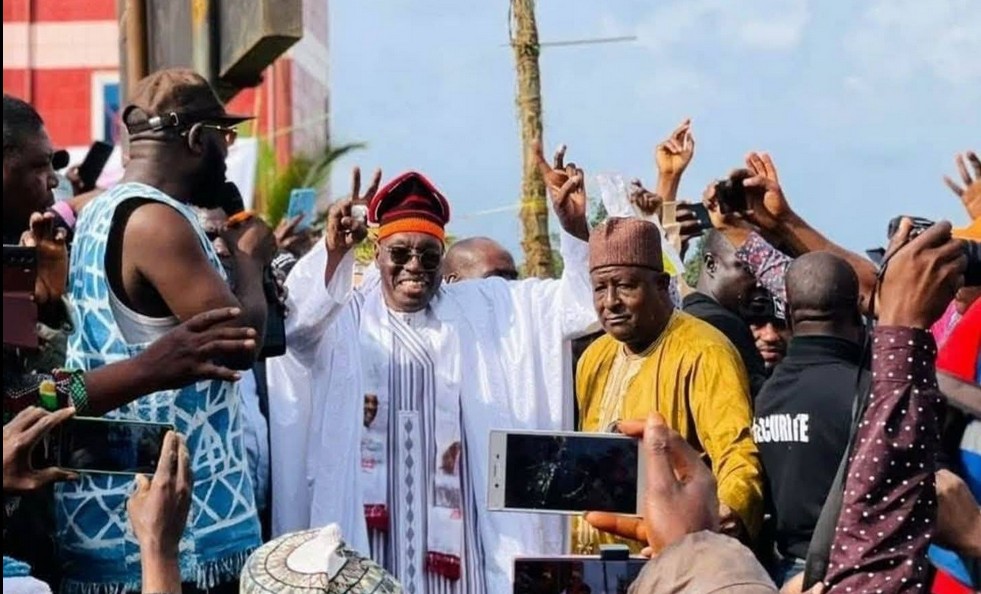- Details
- Politics
Tchiroma Faces Backlash from RAmbazonia Leaders
BAMENDA, Oct 9 – Cameroon Concord — Issa Tchiroma Bakary’s attempt to court voters in the restive western regions has triggered a sharp rebuke from rebels fighting for the restoration of the statehood of former British Cameroon, who insist no faction of their movement backs the presidential hopeful.

A Visit That Stirred the Hornet’s Nest
Tchiroma’s tour through Bamenda and Buea on 4 and 5 October drew crowds curious to see the former minister turned opposition candidate. In Bamenda, he told supporters he was “in regular contact” with U.S.-based rebel spokesman Chris Anu, describing him as a friend and a man open to dialogue. The comment travelled fast across social media and rebel networks, igniting days of furious statements and denials.
Rebels Deny Alliance Claims
Chris Anu acknowledged past exchanges with Tchiroma but distanced himself from the campaign, saying their conversations “never amounted to political endorsement.” He added, “You can disagree with a politician and still share the same table without fear, but I will not call on anyone to vote for Issa Tchiroma.”
Online, exiled activists hardened their tone. Tapang Ivo Tanku mocked Tchiroma’s Bamenda stop in Facebook posts accusing another figure, Mark Bareta, of betraying the movement’s discipline by supposedly backing a “vote for Tchiroma” narrative.
“No One Called Off the Lockdown”
Bareta, often portrayed as a moderate voice among the rebels, fired back the next day. He denied calling for a suspension of the lockdown or endorsing any candidate, stressing that his only comment concerned the “visible excitement of ordinary citizens,” not political support.
He reiterated that “no leader of the restoration movement has lifted the lockdown or urged participation in this election.” His statement calmed some factions but exposed the mistrust that now defines exchanges among rebel figures scattered between exile and underground bases.
Disinformation and Counter-Claims
The controversy deepened when a communiqué attributed to imprisoned activist Bertin Kisob circulated online, alleging an agreement between rebel leaders and the Anglophone branch of the Union for Change 2025 coalition that backs Tchiroma. Within hours, multiple sources dismissed the document as fake, calling it a “fictitious communiqué” designed to confuse voters and delegitimize the movement’s position.
Analysts say the episode reflects a wider information war playing out across encrypted channels and diaspora pages, where competing spokesmen shape the narrative in real time.
Political Fallout
Tchiroma’s team has remained silent on the backlash, focusing instead on campaign rallies in the Far North and Centre regions. Yet the perception of opportunism may haunt him. His image as a reformer capable of dialogue with rebels now collides with open rejection from those same figures.
In Bamenda, several residents told Cameroon Concord News they viewed the visit as “provocation.” Others saw it as courage. Either way, the trip underscores how deeply mistrust runs between Yaoundé’s political class and the restive west.
Context of a Fractured Race
The rift comes just days after President Paul Biya’s return to the campaign trail in Maroua and as violence continues in the rebel-held zones. The Union for Change 2025 coalition’s gamble on Tchiroma was meant to project unity; instead, it has drawn scorn from the very constituency whose grievances dominate the national debate.
With the election only days away, the restored-statehood rebels’ message is blunt: participation equals betrayal. Their threat to enforce the lockdown through polling day could further shrink turnout and test government claims that “security is under control.”
Between Dialogue and Distrust
For observers, the Bamenda incident captures the paradox of Cameroon’s crisis: politicians invoke dialogue, but trust is scarce. Every gesture—whether Biya’s rally in Maroua or Tchiroma’s outreach in the west—feeds suspicion rather than consensus.
As one civil-society organiser in Buea put it, “People are tired of speeches about peace when guns still decide who can speak.” The road to the 12 October vote is lined not with optimism, but with echoes of old promises and fresh disillusion.
- Details
- News Team
- Hits: 219
